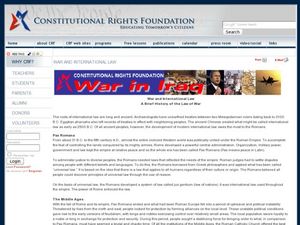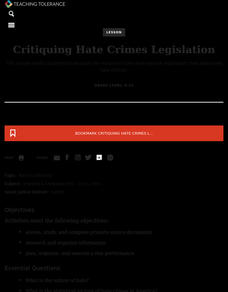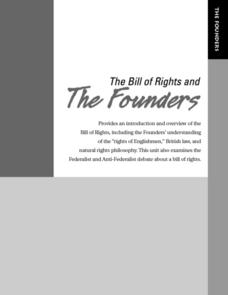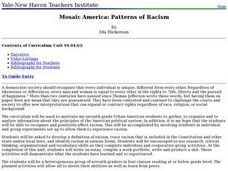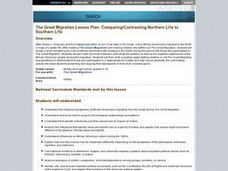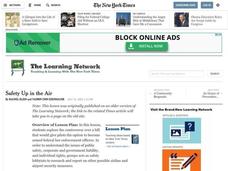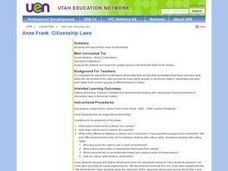Curated OER
War and International Law: A Brief History of the Law of War
Students investigate the history of the law of war. For this international law lesson, students listen to a lecture regarding the history of international law spanning from Pax Romana to Collective Security. Students respond to...
National Endowment for the Humanities
The President Under the Articles of Confederation
The Articles of Confederation sounds like one big, fancy title to middle schoolers. Here, scaffolded steps help to ease novices into understanding this all-important American document. Discussion questions, lesson plan activities, and...
National Endowment for the Humanities
Magna Carta: Cornerstone of the U.S. Constitution
High schoolers use the Internet to read a brief description of Magna Carta (link provided). They "walk through" the document with the teacher, identifying four major themes. Students read and discuss "The Rhetoric of Rights: Americans...
Curated OER
The Supreme Court: The Judicial Power of the United States
Students investigate some basic facts about the Supreme Court by examining the United States Constitution and one of the landmark cases decided by that court. The operation of the Supreme Court forms the focus of the lesson.
Teaching Tolerance
Critiquing Hate Crimes Legislation
The high school instructional activity explores what hate crimes are and how the government has responded to those crimes. Academics read legislation, analyze political cartoons, and complete hands-on-activities to understand what...
NPR
Civil Rights of Japanese-American Internees
Prompted by a viewing of Emiko and Chizu Omori’s Rabbit in the Moon, a documentary about the internment of Japanese-Americans during World War II, high schoolers examine a series of documents, including the Bill of Rights and the UN’s...
Facing History and Ourselves
The Importance of a Free Press
"Congress shall make no law . . . abridging the freedom of speech, or of the press;. . ." Why is this guarantee of free speech and a free press the First Amendment to the US Constitution? Why are these rights so essential to a democracy?...
Curated OER
How a Bill Becomes a Law
Students make a chart on what they learned about how a bill becomes a law. For this law making lesson plan, students research the authority and restrictions placed on Congress on how they make a bill into a law and then present their...
Curated OER
The Supremes
Students discuss steps cases go through to reach Supreme Court, examine Bill of Rights, and rank rights in order of importance to them. Students then research Supreme Court case dealing with one of first ten amendments, and write about...
Curated OER
Get to Know Your Bill of Rights
Sixth graders research and examine the first ten amendments to the Constitution of the United States of America. They sequence events significant to this time period, read and discuss text, and in small groups prepare and present the...
Curated OER
The Bill of Rights and the Founders
Students explain similarities between historical statements of rights and their modern applications, explore ideas of "Rights of Englishmen" and natural rights, discuss evolution of concept of rights and its impact on Bill of Rights,...
Curated OER
Mosaic America: Patterns of Racism
Seventh graders use print and electronic resources to gather and analyze information on the political system in the United States. Using the Constitution, they identify and discuss instances of racism included in amendments and laws. ...
Curated OER
Is It Right to Bear Arms?
Young scholars explore the debate on how to curb gun violence in America. They prepare an argument for or against a strict interpretation of the Second Amendment of the United States Constitution and participate in a debate.
Curated OER
A Nation's Voice
Young scholars research the Constitution and the War Powers Act in order to determine what the powers of the government are in times of conflict. They answer a series of questions then write a legal brief either supporting or condemning...
Curated OER
Comparing/Contrasting Northern Life to Southern Life
Young scholars compare and contrast the lives of African Americans who moved North vs. those who stayed in the South during the era of Jim Crow Laws.
Curated OER
Safety Up in the Air
Students explore the controversy over a bill giving pilots the option to become armed federal law enforcement officers. They brainstorm other possible security measures for airplanes and airports.
ProCon
Gun Control
According to some estimates, there are more guns than people in the United States. Learners decide if America should enact more gun control laws. They analyze information about gun deaths in the United States by year, read about the...
Judicial Learning Center
The Judge and the Jury
Unless you are a lawyer, you might not understand just how unrealistic Law and Order and other legal dramas actually are. Here's a great resource to help scholars of criminology gain a more realistic perspective. The lesson outlines the...
ProCon
Obamacare
Former President Barack Obama reformed the United States' health care system with Obamacare, but is the new legislation good for America? Scholars read a historical timeline about the passage of health care reform laws and compare United...
Curated OER
How was the Constitution Used to Organize the New Government?
How did the United States Congress determine how the new president and vice president would be named when the nation was first established? Who would provide money for the government, and how would the executive branch be organized?
Curated OER
Anne Frank: Citizenship Laws
Pupils study early civilizations and the contributions they made to the foundations of human culture. They discuss why citizenship is valuable and the Constitutional Amendments that are associated with it.
Curated OER
Utah's Legislative Branch: How a Bill Becomes a Law
Seventh graders explain the steps by which a bill becomes a law. They research how a bill becomes a law within the three branches of Utah's government and synthesize their research and discussion in a classroom representation of government.
Curated OER
A More Perfect Union: Barack Obama's Race Speech at the National Constitution Center
High schoolers complete a worksheet on Obama's speech on race prior to the lesson. Students read legislation and examine race relations in the U.S. For this Civics lesson, high schoolers read documents related to equality and law....
NPR
Same-Sex Marriage
The battle over same-sex marriage is a prevalent issue in the United States, and a valuable topic to be discussed in your social studies classroom. Here is a basic outline of introductory questions, focus questions, vocabulary, and media...


